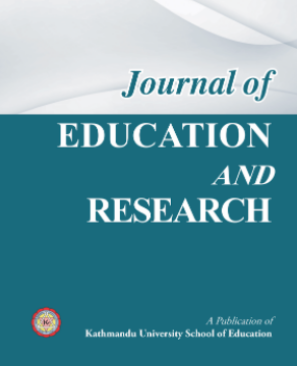
Policy Documents of Nepali Technical and Vocational Education and Training: A Critical Discourse Analysis
Editorial
Journal of Education and Research, Volume 10, Issue 1, 2020, 1-15, https://doi.org/10.3126/jer.v10i1.31872
Publication date: Nov 11, 2020
Views: 698 | Downloads: 1595
How to cite this article
APA
In-text citation: (Poudel, 2020)
Reference: Poudel, T. (2020). Policy Documents of Nepali Technical and Vocational Education and Training: A Critical Discourse Analysis. Journal of Education and Research, 10(1), 1-15. https://doi.org/10.3126/jer.v10i1.31872
Reference: Poudel, T. (2020). Policy Documents of Nepali Technical and Vocational Education and Training: A Critical Discourse Analysis. Journal of Education and Research, 10(1), 1-15. https://doi.org/10.3126/jer.v10i1.31872
Vancouver
In-text citation: (1), (2), (3), etc.
Reference: Poudel T. Policy Documents of Nepali Technical and Vocational Education and Training: A Critical Discourse Analysis. Journal of Education and Research. 2020;10(1):1-15. https://doi.org/10.3126/jer.v10i1.31872
Reference: Poudel T. Policy Documents of Nepali Technical and Vocational Education and Training: A Critical Discourse Analysis. Journal of Education and Research. 2020;10(1):1-15. https://doi.org/10.3126/jer.v10i1.31872
AMA
In-text citation: (1), (2), (3), etc.
Reference: Poudel T. Policy Documents of Nepali Technical and Vocational Education and Training: A Critical Discourse Analysis. Journal of Education and Research. 2020;10(1), 1-15. https://doi.org/10.3126/jer.v10i1.31872
Reference: Poudel T. Policy Documents of Nepali Technical and Vocational Education and Training: A Critical Discourse Analysis. Journal of Education and Research. 2020;10(1), 1-15. https://doi.org/10.3126/jer.v10i1.31872
Chicago
In-text citation: (Poudel, 2020)
Reference: Poudel, Tikaram. "Policy Documents of Nepali Technical and Vocational Education and Training: A Critical Discourse Analysis". Journal of Education and Research 2020 10 no. 1 (2020): 1-15. https://doi.org/10.3126/jer.v10i1.31872
Reference: Poudel, Tikaram. "Policy Documents of Nepali Technical and Vocational Education and Training: A Critical Discourse Analysis". Journal of Education and Research 2020 10 no. 1 (2020): 1-15. https://doi.org/10.3126/jer.v10i1.31872
Harvard
In-text citation: (Poudel, 2020)
Reference: Poudel, T. (2020). Policy Documents of Nepali Technical and Vocational Education and Training: A Critical Discourse Analysis. Journal of Education and Research, 10(1), pp. 1-15. https://doi.org/10.3126/jer.v10i1.31872
Reference: Poudel, T. (2020). Policy Documents of Nepali Technical and Vocational Education and Training: A Critical Discourse Analysis. Journal of Education and Research, 10(1), pp. 1-15. https://doi.org/10.3126/jer.v10i1.31872
MLA
In-text citation: (Poudel, 2020)
Reference: Poudel, Tikaram "Policy Documents of Nepali Technical and Vocational Education and Training: A Critical Discourse Analysis". Journal of Education and Research, vol. 10, no. 1, 2020, pp. 1-15. https://doi.org/10.3126/jer.v10i1.31872
Reference: Poudel, Tikaram "Policy Documents of Nepali Technical and Vocational Education and Training: A Critical Discourse Analysis". Journal of Education and Research, vol. 10, no. 1, 2020, pp. 1-15. https://doi.org/10.3126/jer.v10i1.31872
ABSTRACT
This study critically examines the Technical and Vocational Education and Training (TVET) policy documents of Nepal, not only to understand the specific plans of the government agencies in designing, implementing and expanding TVET programmes but also to problematise discursive practices of TVET programmes in the existing socioeconomic and power hierarchy of Nepali society. More specifically, it aims at understanding the ineffectiveness of these training programmes concerning the target groups. This study makes use of Fairclough’s (1995) model of Critical Discourse Analysis of three inter-related dimensions of description, interpretation and explanation within the theoretical framework of capabilities approach (Sen, 2009). The findings indicate that the policy documents of Nepali TVET prioritise the development of semi-skilled human resources for the low-paid international labour market but ignore the conservation and development of indigenous knowledge systems of diverse ethnic communities of Nepal. The study initiates the discourse that integrating indigenous knowledge systems in TVET programmes provides a sustainable model of development.
KEYWORDS
REFERENCES
---
LICENSE
This work is licensed under a Creative Commons Attribution 4.0 International License.
